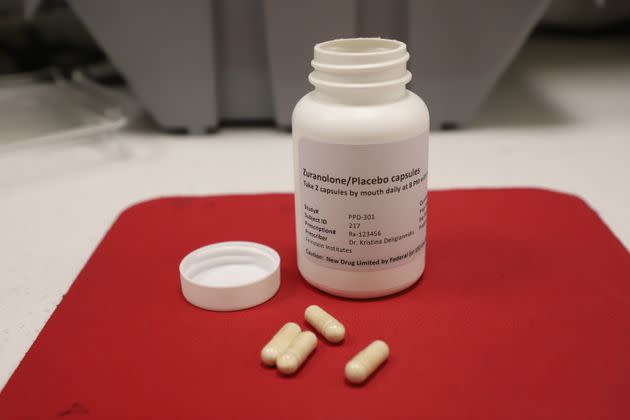General Health Tips & News
FDA Approves First Pill for Postpartum Depression: Zuranolone
By A.S. (staff writer) , published on August 26, 2023

Medicine Telehealth Health
The U.S. Food and Drug Administration (FDA) has given the green light for Zurzuvae (zuranolone), a pioneering oral medication intended to treat postpartum depression (PPD) in adults. Postpartum depression is a form of a major depressive episode that often emerges after childbirth but can also commence during the later stages of pregnancy. Until now, the only treatment for PPD was an intravenous (IV) injection administered by healthcare professionals in specific healthcare facilities.
This medication, known as zuranolone, is intended to be taken daily for a two-week period. Clinical trials focusing on women who experienced severe depression after childbirth have shown positive outcomes. These trials have demonstrated that symptoms such as anxiety, sleep disturbances, loss of pleasure, low energy, guilt, and social withdrawal begin to improve within just three days of starting the medication.
Addressing Serious Postpartum Depression: A Significant Breakthrough
Postpartum depression is a critical mental health condition, characterized by feelings of sadness, worthlessness, guilt, and even thoughts of self-harm or harm to the child. The FDA's approval of zuranolone marks a significant stride towards providing an oral medication option that can benefit many women struggling with these intense and potentially life-threatening emotions.
Dr. Tiffany R. Farchione, the Director of the Division of Psychiatry at the FDA's Center for Drug Evaluation and Research, emphasized the significance of this approval. She noted that postpartum depression can be severe, even leading to thoughts of self-harm or harm to the child. Furthermore, it can disrupt the crucial maternal-infant bond and impact the child's emotional and physical development
Clinical Trials Demonstrate Zurzuvae's Effectiveness in Treating PPD in Adults
The effectiveness of Zurzuvae for treating PPD in adults was demonstrated through two randomized, double-blind, placebo-controlled, multicenter studies. The participants were women with PPD who met the criteria for a major depressive episode as per the Diagnostic and Statistical Manual of Mental Disorders. Their symptoms either started during the third trimester of pregnancy or within four weeks of delivery. The studies involved patients taking Zurzuvae or a placebo for 14 days. The primary measure was the change in depressive symptoms, assessed using the 17-item Hamilton depression rating scale. The patients taking Zurzuvae showed significant improvement in their symptoms compared to those on placebo, and this improvement was sustained for four weeks after the last dose.
Exclusions and Further Research: Breastfeeding and Mild-Moderate Depression
It's important to note that the clinical trials excluded women who were breastfeeding or dealing with mild to moderate depression. For these specific groups, additional research is essential before zuranolone can be recommended as a viable treatment option.
Common Yet Serious Issue: Postpartum Depression Statistics
Postpartum depression is a prevalent concern among new mothers, with approximately 1 in 8 women reporting symptoms following childbirth. This condition goes beyond the ordinary post-birth worries and sadness, potentially impacting both mother-child bonding and the developmental progress of infants.
Unveiling Zuranolone's Mechanism: Neuroactive Steroid and GABA Receptors
Zuranolone is categorized as a neuroactive steroid, a synthetic hormone that influences mood and behavior regulation within the brain. It interacts with GABA receptors, which play a role in managing fear, anxiety, and stress. People with depression often exhibit low GABA levels.
Advantages Over Existing Treatment: Zulresso (Brexanolone)
When compared to the existing postpartum depression treatment, Zulresso (Brexanolone), zuranolone offers several benefits. These include quicker symptom alleviation and the absence of side effects like excessive sedation or sudden loss of consciousness. Zulresso, while effective, requires a longer administration period. The main side effects associated with zuranolone encompass drowsiness, dizziness, sedation, headache, nausea, and diarrhea.
Balancing Advancements and Remaining Questions
In conclusion, the FDA's approval of zuranolone as a pill for postpartum depression represents a promising stride within the realm of mental health. It presents a convenient treatment option that holds the potential to significantly enhance the lives of women grappling with this challenging condition in the aftermath of childbirth. Nonetheless, further research is indispensable for comprehending its enduring effects and its suitability for specific groups of patients.
References
Bendix, A. (August 5, 2023). FDA approves the first pill for postpartum depression. Retrieved from NBC News: https://www.nbcnews.com/health/health-news/first-pill-postpartum-depression-fda-approval-rcna97731
FDA Approves First Oral Treatment for Postpartum Depression. (2023, August 4). Retrieved from FDA: https://www.fda.gov/news-events/press-announcements/fda-approves-first-oral-treatment-postpartum-depression
Find articles related to: Medicine Telehealth Health
More articles about General Health Tips & News
Back to the Health Tips Index




